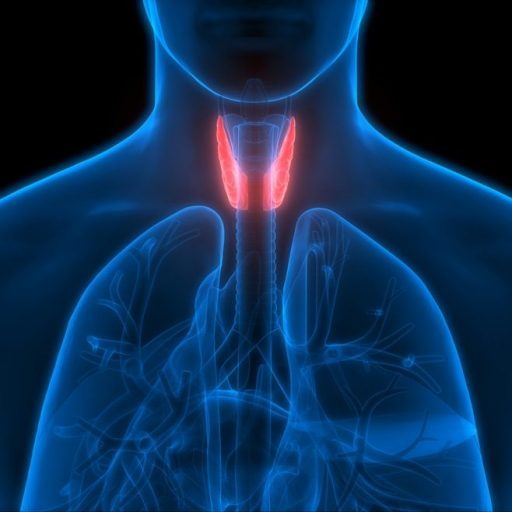Thyroid disorders in women can cause various symptoms, including fatigue, weight changes, and menstrual irregularities. These disorders can impact fertility, pregnancy, and fetal development, making proper monitoring and treatment essential. Hypothyroidism, a common thyroid issue, can lead to weight gain and difficulty losing weight due to a slowed metabolism.
The thyroid gland plays a vital role in regulating a woman’s metabolism, affecting body temperature, energy levels, and nutrient utilization. Thyroid disorders and Polycystic Ovary Syndrome (PCOS) have a complex relationship, with women diagnosed with PCOS at a higher risk of developing thyroid issues.
Moreover, menopause can impact thyroid function due to fluctuating hormone levels, and birth control pills containing estrogen can interfere with thyroid function. Genetic factors, such as a family history of thyroid disorders, can predispose women to these conditions.
Diagnosis of thyroid disorders typically involves physical examinations, blood tests, and imaging scans. Treatment options depend on the underlying condition and may include medication, surgery, or hormone therapy. Women with thyroid disorders should prioritize a healthy lifestyle, maintain regular medical checkups, and follow prescribed treatment plans. Furthermore, consistent monitoring of thyroid function during pregnancy is crucial to ensure healthy fetal development.
For a comprehensive understanding, refer to the listed 15 questions below that explore various aspects of thyroid disorders in women.
1. What are the common symptoms of thyroid disorders in women?
Short Answer
- In women, common symptoms of thyroid disorders include fatigue, weight gain or loss, menstrual irregularities, hair loss, dry skin, and mood swings. Additionally, difficulty sleeping, intolerance to cold or heat, and fertility issues may arise. Early diagnosis and treatment can help alleviate these symptoms.
Long Answer
- The symptoms of thyroid disorders in women are quite diverse, and they can manifest in various ways due to the thyroid gland’s central role in metabolic function and hormonal regulation. Common symptoms include fatigue, fluctuating weight, irregular menstrual cycles, hair loss, dry skin, and mood swings. These symptoms arise from the thyroid gland’s abnormal hormone production, which can significantly impact a woman’s metabolism and overall energy levels.Moreover, these disorders can also affect sleep patterns and tolerance to temperature extremes, further affecting the individual’s quality of life. Fertility can be affected as well, with potential disruptions to normal ovulation cycles. Early detection and appropriate treatment of thyroid disorders are essential to help alleviate these symptoms and prevent more serious complications. The treatment plan typically involves medication to regulate thyroid hormone levels, and lifestyle adjustments might be necessary to manage symptoms effectively.
2. How do thyroid disorders affect a woman’s menstrual cycle?
Short Answer
- Thyroid disorders can significantly impact a woman’s menstrual cycle. Hypothyroidism often leads to heavy and prolonged periods, while hyperthyroidism might result in shorter, lighter cycles. Both disorders can cause irregular menstruation and exacerbate premenstrual symptoms.
Long Answer
Thyroid disorders can significantly influence a woman’s menstrual cycle due to the interplay between thyroid hormones and female reproductive hormones. The thyroid gland, located in the neck, produces hormones that control metabolism. However, these hormones also interact with the body’s other hormones, including those responsible for the menstrual cycle.
Hypothyroidism, which is a state of low thyroid hormone production, often leads to heavier and prolonged periods. This is because the lack of thyroid hormones can disrupt the normal balance of reproductive hormones, leading to an overproduction of the hormone responsible for the uterine lining’s growth. This can result in a thicker lining that takes longer to shed, leading to heavier and prolonged periods.
On the other hand, hyperthyroidism, a state of excessive thyroid hormone production, might result in shorter, lighter menstrual cycles. In this condition, the excess thyroid hormones can interfere with the normal balance of
leading to an underproduction of hormones that stimulate the growth of the uterine lining. This results in a thinner lining that is shed more quickly, leading to lighter and shorter menstrual cycles.
Furthermore, both hypothyroidism and hyperthyroidism can cause irregular menstruation. This is due to the fact that these disorders can disrupt the regular pattern of hormone release in the menstrual cycle, leading to an unpredictable pattern of menstruation.
Additionally, thyroid disorders can exacerbate premenstrual symptoms. This could be because thyroid hormones can influence mood and energy levels, which are commonly affected during the premenstrual phase. Therefore, a disruption in thyroid function could lead to more severe mood swings, fatigue, and other premenstrual symptoms.
3. How does hypothyroidism impact pregnancy and fertility in women?
Short Answer
- Hypothyroidism can adversely affect a woman’s fertility and pregnancy outcomes. Problems like irregular ovulation, increased risk of miscarriage, and pregnancy complications can occur. Moreover, untreated hypothyroidism may lead to developmental issues and lower IQ in children.
Long Answer
-
Hypothyroidism, characterized by an underactive thyroid gland and decreased production of thyroid hormones, can have significant effects on a woman’s fertility and pregnancy outcomes. It can disrupt normal ovulation, which is essential for conception. A woman with hypothyroidism may experience irregular ovulation cycles, reducing her chances of getting pregnant.
Hypothyroidism also increases the risk of miscarriage, primarily due to the important role of thyroid hormones in maintaining early pregnancy. Suboptimal levels of these hormones may not support the pregnancy sufficiently, leading to miscarriage.
In terms of pregnancy complications, women with hypothyroidism are at higher risk of conditions like preeclampsia, placental abruption, and preterm birth. These conditions can have serious implications for both the mother and the baby.
Moreover, if hypothyroidism is not effectively managed during pregnancy, it may have detrimental effects on the child’s development. Thyroid hormones play a crucial role in fetal brain development, particularly during early pregnancy when the fetus is reliant on the mother’s supply of these hormones. Untreated maternal hypothyroidism can lead to neurodevelopmental issues in the child, including lower IQ.
4. What is the role of the thyroid gland in regulating a woman’s metabolism?
Short Answer
- The thyroid gland plays a crucial role in regulating a woman’s metabolism by producing hormones that regulate body temperature, energy levels, and the rate at which the body uses fats and carbohydrates. Imbalances in thyroid hormone production can lead to weight and energy fluctuations.
Long Answer
- The thyroid gland plays an indispensable role in managing a woman’s metabolism. It produces hormones—mainly thyroxine (T4) and triiodothyronine (T3)—that govern vital bodily functions, including body temperature regulation, energy levels, and nutrient utilization. These hormones act on nearly every cell in the body, impacting the rate of metabolic processes and influencing the body’s utilization of fats and carbohydrates. When functioning normally, the thyroid gland ensures a balanced metabolic rate.Imbalances in thyroid hormone production can lead to metabolic irregularities. Hypothyroidism, a condition of low thyroid hormone production, may slow down metabolic processes, leading to symptoms like weight gain and fatigue. On the other hand, hyperthyroidism, characterized by an overproduction of thyroid hormones, can accelerate metabolic processes, causing symptoms like weight loss and increased energy levels. Thus, the thyroid gland’s role in regulating a woman’s metabolism is critical for maintaining health and wellness.
5. How is thyroid cancer diagnosed and treated in women?
Short Answer
- Thyroid cancer in women is diagnosed through physical examinations, blood tests, imaging scans, and biopsies. Treatment options depend on cancer type and stage, with common approaches including surgery, radioactive iodine therapy, hormone therapy, and targeted therapies. Early detection greatly improves treatment success rates.
Long Answer
Thyroid cancer in women is diagnosed through a combination of techniques. A physical examination is usually the first step, which may include a palpation of the neck to detect any unusual lumps or swelling. Blood tests are performed to measure levels of thyroid hormones, which could be indicative of thyroid dysfunction. Imaging scans, such as ultrasound or computed tomography (CT), are used to visualize the thyroid gland and any potential tumors. A biopsy, often performed as a fine needle aspiration, is used to collect cells from suspicious nodules for pathological examination.
The treatment of thyroid cancer depends on the type and stage of the cancer. Surgery is a common treatment, which can involve partial or total removal of the thyroid gland. Radioactive iodine therapy is often used following surgery to destroy any remaining cancer cells or thyroid tissue. Hormone therapy is utilized to replace normal thyroid hormone levels if the thyroid has been partially or completely removed. Targeted therapies, such as tyrosine kinase inhibitors, may be used in more advanced cases to specifically target cancer cells without affecting healthy cells. Early detection of thyroid cancer greatly improves the success rates of treatment, reinforcing the importance of regular check-ups and early investigation of any symptoms.
6. How does menopause affect the functioning of the thyroid gland in women?
Short Answer
- Menopause can impact thyroid function due to fluctuating hormone levels. Decreased estrogen production can trigger or worsen thyroid disorders, such as hypothyroidism, which may manifest as similar symptoms to menopause—like hot flashes, mood swings, or weight gain—making diagnosis more challenging.
Long Answer
Menopause can significantly affect the functioning of the thyroid gland in women. This is primarily due to changes in hormonal levels, particularly estrogen, which decrease during menopause. These fluctuations can potentially trigger or exacerbate existing thyroid disorders, such as hypothyroidism, which is characterized by low production of thyroid hormones. The interplay of these hormonal changes can result in symptoms that overlap with typical menopausal signs, such as hot flashes, mood swings, or weight gain, thereby complicating the diagnosis of thyroid conditions.
It’s worth noting that the thyroid gland plays a critical role in regulating metabolism, controlling body temperature, energy levels, and nutrient utilization. Thus, thyroid disorders during menopause can lead to noticeable metabolic changes, such as unexplained weight gain or loss, and alterations in energy levels. Additionally, the diminished estrogen levels during menopause can lead to increased cardiovascular risks, which are further amplified by thyroid disorders.
Menopausal women with thyroid disorders may also experience more severe symptoms of menopause, such as exacerbated mood swings or more intense hot flashes, due to the effects of imbalanced thyroid hormones on the body’s homeostatic mechanisms. This further underlines the complexity of diagnosing and managing thyroid disorders during menopause.
7. Can thyroid disorders lead to weight gain and difficulty losing weight in women?
Short Answer
- Yes, thyroid disorders, particularly hypothyroidism, can cause weight gain and make it difficult to lose weight in women. Hypothyroidism slows down metabolism, leading to increased fat storage, decreased calorie burning, and subsequent weight gain. Proper treatment can help regulate metabolism and facilitate weight loss.
Long Answer
Absolutely, thyroid disorders, particularly hypothyroidism, can lead to weight gain and pose challenges in shedding those extra pounds for women. It’s all tied to metabolism. The thyroid gland is your body’s natural speed controller, determining how fast or slow your body burns calories and uses energy. With hypothyroidism, there is less thyroid hormone being produced, slowing down your metabolism. This sluggish metabolism results in an increase in fat storage and a decrease in calorie burning, which can lead to weight gain.
This also means that losing weight can be more difficult. Your body isn’t burning calories as efficiently as it normally would, making weight loss a real uphill battle. But don’t lose hope! The silver lining is that with the right treatment, you can get your thyroid hormone levels back to normal, effectively helping to regulate your metabolism. This improved metabolism can make it easier to lose weight and maintain a healthy body weight.
8. What is the relationship between Polycystic Ovary Syndrome (PCOS) and thyroid disorders in women?
Short Answer
- The relationship between PCOS and thyroid disorders is complex, with both conditions sharing similar symptoms, such as menstrual irregularities and infertility. Studies suggest that women with PCOS are more prone to developing thyroid disorders, particularly hypothyroidism, and proper diagnosis and treatment of both conditions are crucial.
Long Answer
Polycystic Ovary Syndrome (PCOS) and hyperthyroidism both involve the overproduction of certain hormones but they don’t cause one another. PCOS and hyperthyroidism can generate similar symptoms like thinning hair, menstrual irregularities, and weight fluctuations, but the mechanisms behind these symptoms are different.
Hyperthyroidism happens when the thyroid gland releases more hormones than required. These hormones regulate various aspects including energy levels, hair growth, and weight. Excessive levels can boost metabolism, leading to unexpected weight loss, irregular heartbeat, and tremors.
PCOS, contrastingly, prompts the ovaries to release unusually high levels of androgens like testosterone, and unusually low levels of estrogen and progesterone. The latter hormones control the menstrual cycle and reproduction. Low levels can lead to menstrual irregularities, missed periods, and unpredictable ovulation.
Research indicates that thyroid disorders are more prevalent in individuals with PCOS. This is because the endocrine system is interconnected, hence, an imbalance in one hormone increases the likelihood of fluctuations in others. Notably, PCOS is more commonly associated with hypothyroidism (underactive thyroid) than with hyperthyroidism (overactive thyroid). Upon diagnosing PCOS, healthcare professionals often assess thyroid activity and prolactin levels to discern the presence of thyroid disorders.
9. How do birth control pills affect thyroid function in women?
Short Answer
- Birth control pills containing estrogen can interfere with thyroid function by increasing the binding of thyroid hormones to proteins, thereby reducing their effectiveness. Consequently, some women on birth control might require adjustments in thyroid medications to maintain optimal hormone levels.
Long Answer
When women take birth control pills that contain estrogen, it can have an impact on the functioning of the thyroid. The estrogen in these pills increases the binding of thyroid hormones to proteins. This binding process reduces the effectiveness of thyroid hormones. Because of this, women on birth control may find that their thyroid hormone levels are not as they should be. To correct this, some women might need to adjust their thyroid medication. This is done to ensure that their hormone levels are optimal, providing the right balance for their bodies to function properly. This shows that birth control pills can directly influence thyroid function in women, making regular check-ups and monitoring essential for those using these forms of contraception.
10. What are the risk factors for developing thyroid disorders in women?
Short Answer
- Risk factors for developing thyroid disorders in women include a family history of thyroid disease, previous thyroid problems, autoimmune diseases, exposure to radiation, and certain medications. Additionally, pregnancy, menopause, or advancing age can increase the risk of thyroid disorders.
Long Answer
Thyroid disorders in women can be influenced by a variety of factors. It’s important to note that familial predisposition plays a significant role, as genetic makeup can influence the likelihood of developing thyroid diseases. If there have been instances of thyroid issues in the family, the probability of developing such disorders may be higher.
In addition, past experiences with thyroid problems can elevate the risk, creating a sort of ‘once bitten, twice shy’ scenario. This is due to the delicate balance of hormones in the body and how easily it can be disrupted, leading to recurring issues.
Autoimmune diseases are another key factor. Conditions like Hashimoto’s disease or Graves’ disease can trigger the body’s immune system to mistakenly attack the thyroid, leading to hypo- or hyperthyroidism respectively.
Exposure to radiation, especially in the neck area, can damage the thyroid and lead to diseases. Certain medications can also interfere with thyroid function, causing disorders.
Lastly, specific life stages and physiological changes in women such as pregnancy, menopause, or simply advancing age can contribute to an increased risk of thyroid disorders. Hormonal changes during these periods may affect thyroid function, leading to imbalances that manifest as thyroid disorders.
11. Are women with a family history of thyroid disorders at a higher risk of developing these conditions?
Short Answer
- Yes, a family history of thyroid disorders increases a woman’s risk of developing the condition. Genetic factors play a significant role in predisposing individuals to thyroid disorders, such as hypothyroidism, hyperthyroidism, and thyroid cancer.
Long Answer
Women who have a family history of thyroid disorders indeed face a higher risk of developing these conditions. This is primarily due to the influence of genetic factors which can predispose individuals to thyroid disorders. For example, they may be more prone to conditions such as hypothyroidism, where the thyroid gland doesn’t produce enough hormones, or hyperthyroidism, where there’s an overproduction of these hormones. Thyroid cancer, a less common but serious disorder, is another condition they might be susceptible to. So, it’s fair to say that genetics play a substantial role in the occurrence of thyroid disorders, making individuals with a family history of these conditions more likely to experience them in their lifetime.
12. How are thyroid disorders in women diagnosed and what tests are involved?
Short Answer
- Diagnosis of thyroid disorders in women typically involves a combination of physical examination, medical history, blood tests (measuring thyroid hormone levels), and imaging scans (e.g., ultrasound or radioactive iodine uptake tests) when necessary. Early detection and diagnosis are vital for optimal treatment.
Long Answer
Thyroid disorders in women are typically diagnosed through a multi-step approach. Initially, a comprehensive medical history is taken into account, where information about symptoms, family history of thyroid or autoimmune diseases, and personal medical history is gathered.
A physical examination follows, where the physician checks the thyroid gland for any signs of enlargement or nodules. They may also assess for symptoms of hyper- or hypothyroidism such as changes in skin texture, hair quality, reflexes, and heart rate.
Blood tests are then conducted to evaluate thyroid function. This usually includes tests to measure levels of Thyroid-Stimulating Hormone (TSH), triiodothyronine (T3), and thyroxine (T4). TSH is produced by the pituitary gland and stimulates the thyroid to produce T3 and T4. High levels of TSH can indicate hypothyroidism (underactive thyroid), while low levels can suggest hyperthyroidism (overactive thyroid).
In addition, antibodies against the thyroid (Anti-thyroid peroxidase or Anti-TPO) may be tested, especially in cases where Hashimoto’s thyroiditis, an autoimmune cause of hypothyroidism, is suspected.
If initial tests suggest a thyroid disorder or if a nodule is felt during the physical examination, imaging studies such as an ultrasound of the thyroid may be performed. The ultrasound can help visualize the size of the thyroid and characteristics of any nodules, such as their size, composition, and vascularity. In certain cases, a radioactive iodine uptake test may be used to see how well the thyroid is functioning.
In some situations, a biopsy may be needed, particularly if the ultrasound shows nodules with suspicious features. This is usually done as a fine-needle aspiration (FNA), where a small sample of thyroid tissue is taken for analysis.
Early detection and diagnosis of thyroid disorders are essential, as they allow for timely treatment, which can help prevent complications and improve the quality of life for women affected by these conditions.
13. What are the treatment options for managing thyroid disorders in women?
Short Answer
- Treatment options for thyroid disorders in women depend on the underlying condition. Hypothyroidism is usually treated with synthetic thyroid hormone replacement, while hyperthyroidism treatments include anti-thyroid medications, radioactive iodine therapy, or surgery. Regular monitoring and medication adjustments help maintain hormone balance.
Long Answer
The variety of treatment options for managing thyroid disorders in women hinges on the specific condition diagnosed. In the case of hypothyroidism, where the thyroid gland doesn’t produce enough hormones, synthetic thyroid hormone replacements are generally prescribed. These medications, like levothyroxine, aim to restore normal hormone levels and reverse the symptoms of hypothyroidism.
When dealing with hyperthyroidism, where there is an overproduction of thyroid hormones, treatments vary. Anti-thyroid medications are often used to reduce the overproduction of thyroid hormones. Another option is radioactive iodine therapy, which curbs hormone production by shrinking the thyroid gland. In some scenarios, surgery might be required to remove part or all of the thyroid gland.
Regardless of the treatment approach, it is vital to regularly monitor thyroid function and adjust medication doses to maintain a balanced hormone level. This continuous oversight ensures the most effective management of thyroid disorders and helps minimise any potential health risks.
14. How can women with thyroid disorders maintain a healthy lifestyle and manage their symptoms?
Short Answer
- Women with thyroid disorders can maintain a healthy lifestyle by following a balanced diet, exercising regularly, managing stress, getting adequate sleep, and consistently taking prescribed medications. Regular medical checkups and open communication with healthcare providers are essential for effective symptom management.
Long Answer
Women with thyroid disorders can maintain a healthy lifestyle and manage their symptoms through a combination of strategies. First, a balanced diet rich in vitamins, minerals, and fibre is key. Consuming sufficient iodine, found in dairy, fish, and iodised salt, supports thyroid function. Exercise also plays a crucial role. Regular physical activity boosts metabolism, aids in weight management, and improves mood — all of which are beneficial for thyroid health.
Second, proper medication adherence is essential. Thyroid disorders often require long-term treatment, and consistent use of prescribed medicines helps to keep symptoms in check. Stress management techniques such as meditation, yoga, or other mindfulness practices can also be beneficial as stress can exacerbate thyroid issues.
Lastly, regular check-ups with healthcare professionals ensure that the treatment plan is working and can be adjusted as necessary. It’s a bit of a juggling act, but with the right support and dedication, women with thyroid disorders can lead a healthy, fulfilling life.
15. What is the importance of monitoring thyroid function during pregnancy and how can it affect the baby’s development?
Short Answer
- Monitoring thyroid function during pregnancy is crucial as both hypothyroidism and hyperthyroidism can impact fetal development. Untreated thyroid disorders can result in preterm birth, low birth weight, and developmental delays. Regular testing and appropriate treatment adjustments ensure a healthier pregnancy and optimal baby development.
Long Answer
The significance of tracking thyroid function during pregnancy is immense due to its far-reaching implications for both mother and baby. Thyroid hormones play a vital role in the baby’s brain development, particularly during the first trimester, when the baby is wholly dependent on the mother’s thyroid hormones. Additionally, these hormones aid in the regulation of the mother’s metabolism, crucial for providing necessary nutrients to the growing baby.
Both hypothyroidism and hyperthyroidism can significantly impact fetal development. Hypothyroidism, marked by inadequate thyroid hormone production, can lead to preterm birth, low birth weight, and developmental delays in the baby. It can also result in complications for the mother, such as pre-eclampsia and miscarriage. On the other hand, hyperthyroidism, characterized by excessive thyroid hormone production, can cause similar problems, with additional risks of fetal hyperthyroidism and neonatal Graves’ disease.
Therefore, regular testing of thyroid function becomes paramount during pregnancy. It aids in the early detection and management of thyroid disorders, allowing for necessary treatment adjustments. This proactive approach ensures a healthier pregnancy, reducing risks associated with untreated thyroid disorders. Moreover, it supports optimal baby development, safeguarding the child’s health and future potential. The collaboration between expectant mothers and healthcare professionals in monitoring and managing thyroid function can make a significant difference in pregnancy outcomes and the baby’s health.






